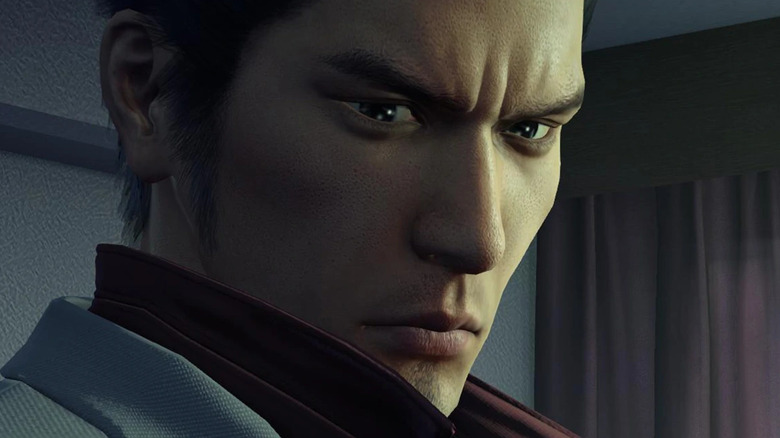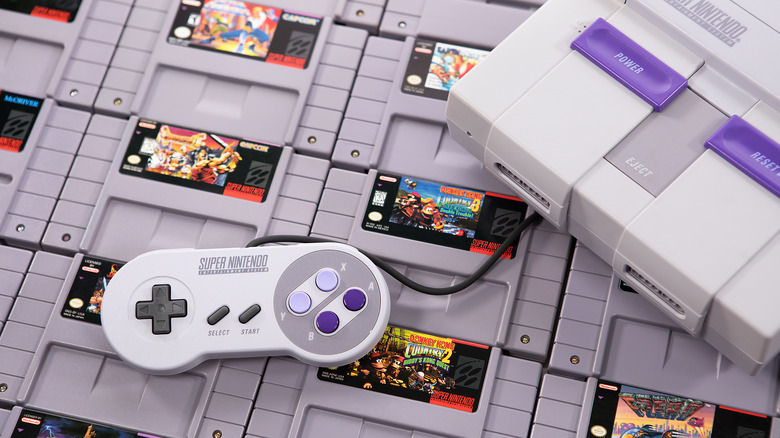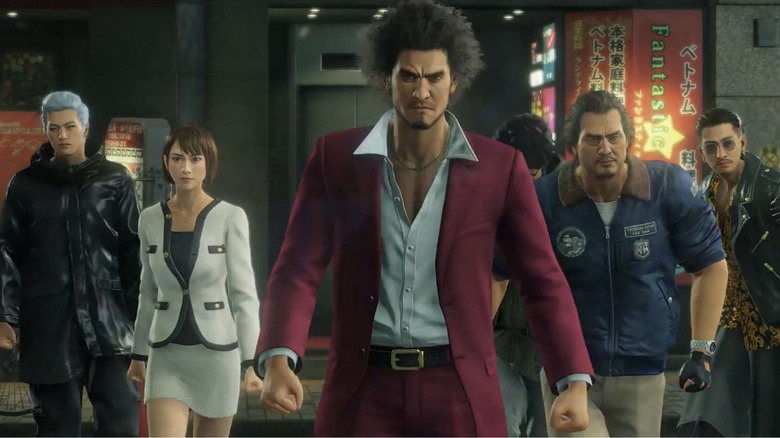Why The Yakuza Was A Threat To The Super Nintendo's Release
It turns out that the Yakuza, the infamous organized crime organization in Japan, has a connection to gaming history that goes beyond inspiring the popular "Yakuza" franchise. This network of criminal gangs isn't just a work of fiction in a series known for its embarrassing minigames and more than a few creepy moments. The Yakuza is very real and, at one time, was prominent enough for Nintendo to consider it a threat to its business.
In November of 1990, Nintendo prepared to launch its new Super Nintendo console (via Retro Gamer). The follow-up to the Nintendo Entertainment System was highly anticipated by fans and, based on pre-orders, Nintendo predicated that the offering would prove to be a hit. Still, leadership in the company felt concerned about the upcoming shipment of the consoles to stores. The fear was that Yakuza gangs would hijack the shipment and sell the systems themselves for exorbitant prices. Nintendo's then president, Hiroshi Yamauchi, and his advisor and head of the general affairs department, Hiroshi Imanishi, had no intention of letting that happen. Thus, Operation Midnight Shipping came into the world.
Operation Midnight Shipping
As journalist and author David Sheff explained in his hit book, "Game Over: How Nintendo Conquered the World," Operation Midnight Shipping was an exciting name for a simple plan. Early on the morning of November 21, before most of Japan had risen to start the day, Nintendo loaded up and shipped out hundreds of thousands of consoles to distributors all over the country. Shipments of the two launch titles for the Super Nintendo, "Super Mario World" and "F-Zero," accompanied the consoles. The high level of secrecy, worthy of Metal Gear Solid's Foxhound, meant that only a select few knew about the plan. It proved to be a complete success, thwarting the Yakuza and ensuring a great start to the Super Nintendo's release.
This may seem like an overly dramatic move on the part of Nintendo but it's important to note that the Yakuza has a long history in Japan and has been quite powerful at points in its timeline. The collection of gangs, which sometimes compete with one another, traces its roots back to the 18th Century and saw its membership boom after World War II (via the National Criminal Justice Reference Service). Indeed, during the U.S. occupation of Japan, the American military considered the Yakuza a danger to its efforts to stabilize the country. Given this history and Nintendo's own past with the Yakuza, it is perhaps understandable that it felt the need to take these precautions.
Nintendo's Yakuza connections
It might surprise many people to learn that prior to becoming a giant in the video game industry, Nintendo manufactured playing cards with links to the Yakuza. Zack Millsap laid out this history for CBR, explaining that, before video games even existed, Nintendo made and sold hanafuda cards. These cards, featuring pictures of flowers rather than numbers, were a favorite of the Yakuza, which hosted high-stakes hanafuda games in its gambling dens. While many other companies stopped producing the cards because of their unsavory connections, Nintendo invested more in the growing market and continued to sell to the Yakuza.
Later, Nintendo briefly got involved in the operation of love hotels, Japan's version of hourly rate no-tell-motels, and again became connected to the Yakuza. According to Millsap, Nintendo allowed the criminal enterprise to operate a sex work business out of its establishments (although it may not have had much say in the matter) and even set up gambling dens. In the 1960s, Nintendo left that industry and eventually transitioned to the family-friendly video game company players know today.
Nintendo doesn't seem to have forgotten it's past with the Yakuza. In addition to taking it into account during the launch of the Super Nintendo, the company continues to distance itself from the organization and anything that might connect it to unsavory elements of society. Last year, IGN reported on documents examined by games journalist Stephen Totilo. The documents, released as part of an ongoing, unrelated court case, revealed that Nintendo contractually requires Japanese publishers and developers that wish to partner with it to have no ties to any "anti-social force" like the Yakuza. Nintendo certainly has come a long way since its founding in 1889.



